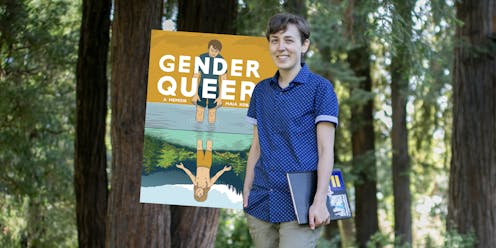Gender Queer was the last book an Australian council tried to ban. It’s still being appealed in federal court
- Written by Penni Russon, Senior Lecturer, School of Communication, Monash University

Gender Queer, a graphic-novel memoir of coming out as non-binary, was at the centre of Australia’s perhaps highest-profile book banning furore in recent years – that is, before western Sydney’s Cumberland City Council banned books on same-sex parenting[1].
And Gender Queer’s status is still threatened: Bernard Gaynor, the conservative Catholic activist who led the call to ban it is taking the Minister for Communication and the Australian Classification Review Board to the Federal Court of Australia. The decision will come later this year.
Researcher Nicole Moore told The Book Show’s Sarah L'Estrange[2] yesterday that, contrary to what many of us think, this wave of book bannings is not copied from the US.
Australia has a long history of book banning and before Gough Whitlam’s government in the 1970s, was “one of the most censorious countries in the English-speaking world”. For example, in 1932, Aldous Huxley’s A Brave New World (now a standard school text) was banned in Australia[3].
“We have a long history of Christian associations and churches organising to ban books,” Moore said, particularly citing sex, sexuality and gender as reasons. The Gender Queer ban, she said, provoked “concerns about some models of Christian understanding that are perhaps narrow in their models of how people should live and how books should express the ideas of gender identity and sexual expression”.
Sexually explicit illustrations, including of a sexual fantasy inspired by Plato’s symposium, are often cited (and taken out of context) by those looking to ban the book. But American author Maia Kobabe (who uses e/em/eir pronouns) told The Book Show that’s not why the book is so embattled. Rather, it’s the title, its comic form, its several major literary awards and that it’s a “happy” coming-out story “where I face no negative consequences from coming out”.
The book – which began life[4] as “a well-received but minor debut book from a new author” – has become a story of censorship, culture wars, and of the way young trans lives have been caught up in ideology wars.

















